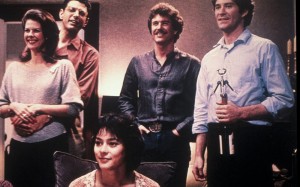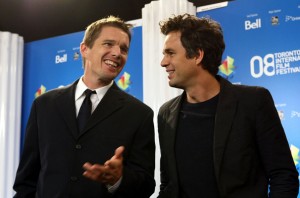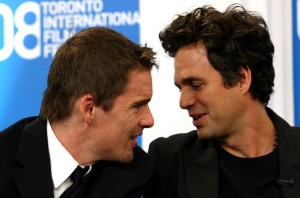The Reel Guys share standout moments from more than 30 years of TIFF
 By Richard Crouse & Mark Breslin – Metro Reel Guys
By Richard Crouse & Mark Breslin – Metro Reel Guys
If you can’t make it to the Toronto International Film Festival but still want to get a flavour of the films, the Reel Guys — Richard Crouse and Mark Breslin — have some movies and some memories for you. They’ve been attending the festival for years and have seen it all, from actors’ tears to classic films to medical emergencies to stars being born. It’s a wild time, but like Dr. Hunter S. Thompson said, “Buy the ticket, take the ride.”
Richard: Mark, I’ve been going to TIFF for 30 years and covering it for almost 20 so I can’t even begin to imagine how many movies I’ve seen in the 10 days after the first Thursday after Labour Day. Hundreds? Thousands? Somewhere in between, I’m sure. There have been many standouts, but my mind immediately goes to Lost in Translation. Perhaps because it’s Bill Murray Day (isn’t every day?), but I remember walking out of that theatre thinking I had just seen a star being born. Bill Murray was great, but Scarlett Johansson was memorable. She had been in things before, but that movie and TIFF made her a star that day.
Mark: Great film, Richard, but I saw it on a rainy night in Vancouver. If you want to go way, way back, I saw the gala premiere of The Big Chill at University Theatre in 1983. It was the first film that channeled baby boomer angst and it hit me hard — in a good way. So many great performances, but I still remember William Hurt and Kevin Kline. Meg Tilly has the best line when she says, “I don’t know many happy people. What are they like?”
RC: One of the things that happens at TIFF is you see movies that never open anywhere for some reason. What Doesn’t Kill You, a gritty crime drama set in South Boston starring Ethan Hawke, Mark Ruffalo and Amanda Peet, was one of those. I really liked the movie and I hosted the press conference and that’s where something really memorable, for me, happened. During the conference, I looked over and Ruffalo had his head in his hands. At first I wasn’t sure what was happening. Was he tired? Taking a break from the conversation? Asleep? Turns out the conversation and questions had made him emotional and he was crying. I didn’t expect him to break down into tears and be unable to speak, but Hawke jumped in and spoke about how Ruffalo is a committed actor who completely throws himself into his roles.
MB: There’s more to that story … Just before the press conference, for no apparent reason, I shivved Ruffalo in the left kidney, and he must have been in a lot of pain. But I know what you mean by movies that don’t open. The film immediately disappeared. Then there was the recent Lebanese movie The Attack, which was a harrowing story of a Palestinian doctor who finds out his wife is a terrorist. After the film, the director did a Q&A describing death threats he got and the tribulations he endured just to get the film made. It was almost as good as the film itself.
RC: You never know what will happen at the screenings, whether it’s a wild Q&A or the audience reaction. A few years ago the amputation sequence in Danny Boyle’s 127 Hours, was so intense several members of the audience required medical attention.
MB: Sometimes the volume of movies you see yields unexpected results. I remember the Saturday night I saw Jason Reitman’s Up In The Air immediately followed by the Coen Brothers’ A Serious Man. My two favourite movies of 2009, back to back!


